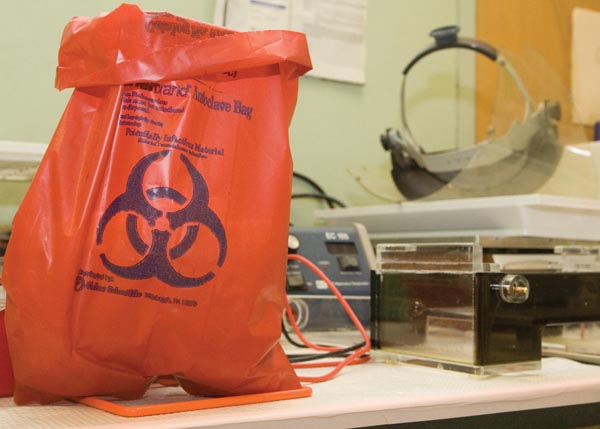CSUS is scene of new CSI program

The CSI TRU program is the solution to the lack of internships available in the biology departmen:
November 12, 2007
With all the new crime scene investigation shows on television these days, it’s no wonder Sacramento State has its own crime scene investigation program, right? Wrong.
Instead, biological science professor Ruth Ballard said the crime scene investigation television shows are not always realistic and most major network shows, like “Bones” are just ridiculous.
But not all the popular shows are bad. Ballard said she will watch the shows that are documentary-based such as “Forensic Files.”
This semester, Ballard is spearheading a new program called CSI TRU, or Crime Scene Investigation Training Research and Undergraduates, with the goal being to cater to undergraduate students interested in becoming forensic investigators.
Ballard said forensics is a hot job field, pays well and offers a lot of room for growth. She said that because the Department of Justice and the Sacramento Crime Lab – two large employers of forensic scientists – are only minutes away from campus, Sac State is a natural place to start this program.
She credits popular television shows like “CSI” for the rise in popularity of forensics, but said many places are requiring students have internship experience, something that was never previously required.
Ballard said the main problem is there aren’t any labs that offer internships. The only alternative for students is to go back to school and get a master’s degree; something she said isn’t necessary for the job and is an expense that can cost a student up to $32,000.
“I realized that we weren’t preparing our students for the job field,” Ballard said. “Because there were no internships available anywhere, this program was a solution to that problem.”
Ballard said students who go through the program get a very hands-on experience and are fully ready to find a job after graduation. She said, however, that not many students are aware the program even exists.
The current program only consists of 12 students, she said.
Ballard said she begins each lab with a mock crime scene. She said she teaches her students how to study the evidence from a biological perspective.
Each student has his or her own lab kit and each is currently working on gathering tissue samples from 25 random individuals, she said. The tissue samples include blood, hair and saliva.
CSI TRU students are currently studying to see if a person’s Deoxyribonucleic acid profile is consistent within the tissue.
“Not everyone has a consistent DNA profile,” Ballard said. “One of our students had a sample of a woman’s hair who had six different mutations in her DNA.”
Alisa Shreve, a senior biological science major, said she has wanted to study forensic science since high school and thinks it is a fascinating field.
Shreve is currently in the CSI TRU program and said she was a criminal justice major for three years before she realized she had to make the switch to biology.
“The field is so big,” she said. “It is imperative that you get good advice from your advisers and know what it is exactly that you have to take. It’s hard because I wasn’t able to just read about this information.”
Ballard said many students who want to be crime scene investigators are misdirected in what they should study.
Shreve said every case she studies in the lab is different and interesting. She and Ballard agree that forensic science is nothing like what most television shows portray.
Maria Burchett, a biological science major with a concentration in forensic biology, said she always had an interest in science and one day hopes to work in a crime lab.
Burchett said she was told not to watch the popular crime scene shows because they “put an unrealistic spin on what actually goes on in a lab.”
“The first thing I heard in class was to forget what you see on TV,” she said. “It’s not real.”
“We are trying to explode the myths of what forensic science is really about,” Ballard said. “We’re scientists, not cops. We can’t arrest anyone.”
Adina Zerwig can be reached at [email protected]
Click here to read more about a DNA database helping solve mysteries internationally.




























































































































